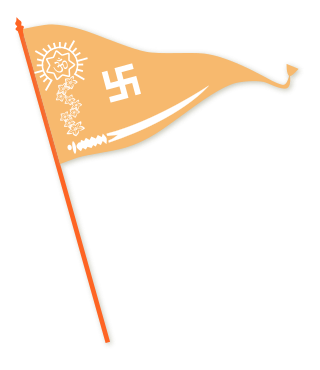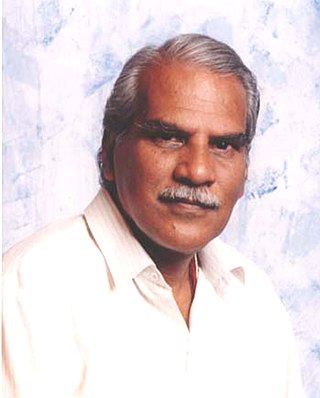The following outline is provided as an overview of and topical guide to Hinduism:

The Akhil Bharatiya Jana Sangh (abbreviated asBJS or JS, short name: Jan Sangh, was an Indian nationalist political party. This party was established on 21 October 1951 in Delhi, and existed until 1977. Its three founding members were Shyama Prasad Mukherjee, Balraj Madhok and Deendayal Upadhyaya. Jan Sangh was the political arm of Rashtriya Swayamsevak Sangh, a Hindu nationalist volunteer organisation. In 1977, it merged with several other left, centre and right parties opposed to the Indian National Congress and formed the Janata Party. In 1980, the members of erstwhile Jan Sangh quit the Janata party after the defeat in the 1980 general elections and formed the Bharatiya Janata Party, which is the direct political successor to the Jan Sangh.

Syama Prasad Mookerjee was an Indian politician and academician. Noted for his opposition to Quit India movement within the independence movement in India, he later served as India's first Minister for Industry and Supply in Prime Minister Jawaharlal Nehru's cabinet after breaking up with the Hindu Mahasabha. After falling out with Nehru, protesting against the Liaquat–Nehru Pact, Mukherjee resigned from Nehru's cabinet. With the help of the Rashtriya Swayamsevak Sangh, he founded the Bharatiya Jana Sangh, the predecessor to the Bharatiya Janata Party, in 1951.

Somnath Chatterjee was an Indian politician who was associated with the Communist Party of India (Marxist) for most of his life, though he had been a non affiliated independent during his last decade. He was the Speaker of the Lok Sabha from 2004 to 2009.
Vinay Katiyar is a politician and the founder-president of Bajrang Dal, the youth wing of the Hindu nationalist organisation Vishwa Hindu Parishad (VHP) in India. He has served as an All India General Secretary of the Bharatiya Janata Party (BJP), and as a Member of Parliament in both the Lok Sabha and the Rajya Sabha.

Akhil Bharatiya Hindu Mahasabha is a Hindu nationalist political party in India.
The Sanatan Dharma Maha Sabha (SDMS), pronounced[sənɑːt̪ənəd̪ʰərməməɦɑːsəbʰɑː], colloquially known as the Maha Sabha, is the largest and most influential Hindu organization in Trinidad and Tobago. It operates 150 mandirs, over 50 schools, and has its own radio station, Radio Jaagriti 102.7 FM, and TV channel, TV Jaagriti. They also operate the Indian Caribbean Museum of Trinidad and Tobago. It was formed in 1952 when Bhadase Sagan Maraj engineered the merger of the Sanatan Dharma Association and the Sanatan Dharma Board of Control. An affiliated group, the Pundits' Parishad, has 200 affiliated pundits. The organisation's headquarters are located in St. Augustine.

Akhil Bharatiya Vidyarthi Parishad (ABVP) (transl. All India Students' Council) is a right-wing and a independent all India student organisation affiliated to the Hindu nationalist organisation Rashtriya Swayamsevak Sangh (RSS).

Sushma Swaraj was an Indian lawyer, politician and diplomat who served as the Minister of External Affairs of India in the first Narendra Modi government from 2014 to 2019. She was the second person to complete a 5-year term as the Minister of External Affairs, after Jawaharlal Nehru. A senior leader of the Bharatiya Janata Party (BJP), Swaraj was the second woman to hold the office of Minister of External Affairs, after Indira Gandhi. She was elected seven times as a Member of Parliament and three times as a Member of the Legislative Assembly. At the age of 25 in 1977, she became the youngest cabinet minister of the Indian state of Haryana. She also served as Chief Minister of Delhi for a short duration in 1998 and became the first female Chief Minister of Delhi.

Faggan Singh Kulaste is an Indian politician. He served as the Minister of State for Rural Development and Steel of India in the Government of India. He is a member of the Bharatiya Janata Party (BJP). He was sworn in as Union Minister of State in the Ministry of Steel on 30 May 2019 under Prime Minister Narendra Modi. Kulaste is elected as a member of the 17th Lok Sabha (2019–2024). He represents the Mandla constituency of Madhya Pradesh. He was also Minister of State in Modi government. He has previously been a member of the 11th, 12th, 13th, 14th, 16th and 17th Lok Sabha.

Vivekanad Sharma was a Fiji Indian politician and religious worker but is best known for his promotion of the Hindi language in Fiji and abroad.
Saroj Pandey is an Indian politician belonging to the Bharatiya Janata Party (BJP). She is the National Vice President of Bharatiya Janata Party. Previsously, she served as member of the Rajya Sabha, upper house of the Indian Parliament and also served as National General Secretary of Bharatiya Janata Party. Prior to becoming Rajya Sabha MP, she was elected to 15th Lok Sabha from Durg and was also Member of Chhattisgarh Legislative Assembly.
Vishnu Ghanashyam Deshpande was an Indian politician. He was born in Mehkar, Vidarbha, Maharashtra. V.G. Deshpande was the general secretary of the Akhil Bharatiya Hindu Mahasabha.
Mangru Ganu Uikey was an Indian politician and Social worker, who devoted his entire life working for the upliftment and welfare of tribal people. He served as a Member of Parliament in the 1st, 2nd, 3rd, 4th and 5th Lok Sabha of the Govt of India. He was awarded with the honour of "Padma Shri" in 1969 by the Government of India for his outstanding contribution in the field of social work.
Elections were held in March 1952 for the Bihar Legislative Assembly. There were 276 constituencies with 50 of them being two-member constituencies. The Indian National Congress (INC) stormed into power. Shri Krishna Singh became the first elected Chief Minister of Bihar and Dr. Anugrah Narayan Sinha became the first Deputy Chief Minister cum Finance Minister of the state.

Sudhir Gupta is an Indian politician and member of the Bharatiya Janata Party. He is currently a member of parliament, having been elected twice, in 2014 and 2019, to the Lok Sabha from Mandsour constituency in Madhya Pradesh.
The Jawaharlal Nehru University Students' Union or JNUSU is a students' union at Jawaharlal Nehru University, New Delhi.
Dilip Saikia is an Indian politician. He was elected to the Lok Sabha, the lower house of the Parliament of India, from Mangaldoi in Assam in the 2019 Indian general election as a member of the Bharatiya Janata Party. He is currently the national General secretary of Bharatiya Janata Party. He is a former state Secretary and state organising secretary of Akhil Bharatiya Vidyarthi Parishad ABVP Assam Pradesh.









